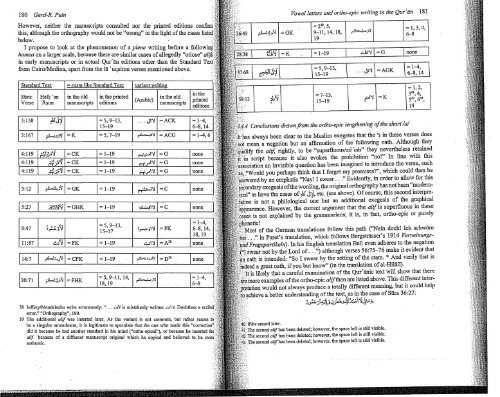reynolds-the-quran-in-its-historical-context-2
reynolds-the-quran-in-its-historical-context-2
reynolds-the-quran-in-its-historical-context-2
You also want an ePaper? Increase the reach of your titles
YUMPU automatically turns print PDFs into web optimized ePapers that Google loves.
186 Gerd-R. Pu<strong>in</strong>However, nei<strong>the</strong>r <strong>the</strong> manuscripts consulted nor <strong>the</strong> pr<strong>in</strong>ted editionsthis, although <strong>the</strong> orthography would not be ''wrong" <strong>in</strong> <strong>the</strong> light of <strong>the</strong> casesbelow.I propose to look at <strong>the</strong> phenomenon of a plene writ<strong>in</strong>g before ahamza oh a larger scale, because <strong>the</strong>re are similar cases of allegedly "otiose" .<strong>in</strong> early manuscripts or <strong>in</strong> actual Qur'an editions o<strong>the</strong>r than <strong>the</strong> Standard Textfrom Cairo/Med<strong>in</strong>a, apart from <strong>the</strong> Ia 'uqsimu verses mentioned above. .~':~{':I=GKVowel letters and ortho-epic writ<strong>in</strong>g <strong>in</strong> <strong>the</strong> Qur'an 181=240, 5,9-11, 14, 18,19= 1,3,4,6-8(Arabic)manuscripts= 7-13,15-19= 5, 9-13, ... JI':I =ACK15-19= 5, 7-19 ~~~ =ACG38 Jeffery/Mendelsohn write erroneously: " ... .:.;'lJ is mistakenly written . .:.;I \1. Doubtless aerror." "Orthography", 190.39 The additional a/if was <strong>in</strong>serted later. As <strong>the</strong> variant is not common, but ra<strong>the</strong>r seemsbe a s<strong>in</strong>gular amendment, it is legitimate to speculate that <strong>the</strong> one who made this "m,rre,,t;m,"did it because he had ano<strong>the</strong>r standard <strong>in</strong> his m<strong>in</strong>d ("ortho-epical"), or because he <strong>in</strong>serteda/if because of a different manuscript orig<strong>in</strong>al which he copied and believed to beau<strong>the</strong>ntic.Conclusions drawn from <strong>the</strong> ortho-epic leng<strong>the</strong>n<strong>in</strong>g of <strong>the</strong> short Ia/always been clear to <strong>the</strong> Muslim exegetes that <strong>the</strong> ':1 <strong>in</strong> <strong>the</strong>se verses doesmean a negation but an affirmation of <strong>the</strong> follow<strong>in</strong>g oath. Although <strong>the</strong>y<strong>the</strong> alif, rightly, to be "superfluous/za 'ida" <strong>the</strong>y never<strong>the</strong>less reta<strong>in</strong>edbecause it also evokes <strong>the</strong> prohibition "no!" In l<strong>in</strong>e with this~a~soc:iation an <strong>in</strong>visible question has been imag<strong>in</strong>ed to <strong>in</strong>troduce <strong>the</strong> verse, suchould you perhaps th<strong>in</strong>k that I forget my promises?", which could <strong>the</strong>n be':answered by a:n emphatic ''Nay! I swear ..."Evidently, <strong>in</strong> order to allow for thisisecortdary exegesis of <strong>the</strong> word<strong>in</strong>g, <strong>the</strong> orig<strong>in</strong>al orthography has not been "modemashave <strong>the</strong> cases of.&\ Jif, etc. (see above). Of course, this second <strong>in</strong>terpreisnot a philologi~al one but an additional exegesis of <strong>the</strong> graphical.apjpearartce. However, <strong>the</strong> correct argument that <strong>the</strong> alif is superfluous <strong>in</strong> <strong>the</strong>seis not expla<strong>in</strong>ed by <strong>the</strong> grammarians; it is, <strong>in</strong> fact, ortho-epic or purelyof <strong>the</strong> German translations follow this path ("Ne<strong>in</strong> doch! Ich schwore.. " <strong>in</strong> Paret's translation, which follows Bergstriisser's 1914 Verne<strong>in</strong>ungsFragepartikeln). In his English translation Bell even adheres to <strong>the</strong> negation· not by <strong>the</strong> Lord of .. .'') although verses 56:75-76 ma:ke it evident thatis <strong>in</strong>tended: "So I swear by <strong>the</strong> sett<strong>in</strong>g of <strong>the</strong> stars. * And verily that isa great oath, if you but know" (<strong>in</strong> <strong>the</strong> translation of al-Hilali).is likely that a careful exam<strong>in</strong>ation of <strong>the</strong> Qur'anic text will show that <strong>the</strong>re<strong>in</strong>ore examples of <strong>the</strong> ortho-epic alifthan are listed above. This different <strong>in</strong>terwouldnot always produce a totally different mean<strong>in</strong>g, but it could help•. achieve a better understand<strong>in</strong>g of <strong>the</strong> text,, as <strong>in</strong> <strong>the</strong> case of Siira 36:22:·. ·. • < ,, .!.;)I< .. ,\..;: -~lllil":i"J'\;.'.iJY""" :r , • ._,


